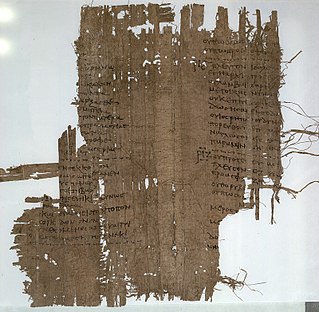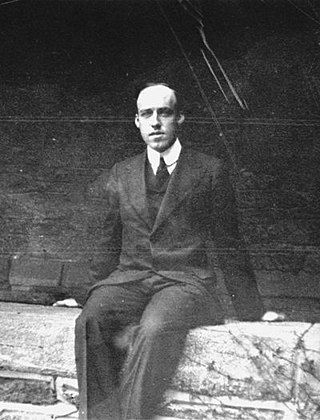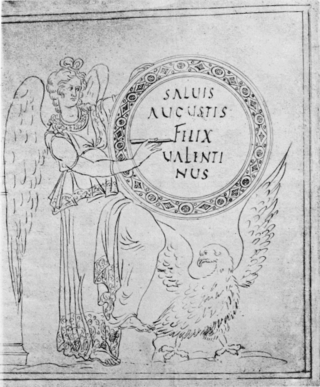Related Research Articles
Greek literature dates back from the ancient Greek literature, beginning in 800 BC, to the modern Greek literature of today.
Physical Review Letters (PRL), established in 1958, is a peer-reviewed, scientific journal that is published 52 times per year by the American Physical Society. As also confirmed by various measurement standards, which include the Journal Citation Reports impact factor and the journal h-index proposed by Google Scholar, many physicists and other scientists consider Physical Review Letters to be one of the most prestigious journals in the field of physics.

The Sortes Astrampsychi was a popular Greco-Roman fortune-telling guide ascribed to Astrampsychus, identified by ancient authors as a magus who lived in Persia before the conquest of Alexander the Great, or an Egyptian sage serving a Ptolemaic king. While other sortes involved the casting of dice, the Sortes Astrampsychi did not. Instead, a questioner chose a prewritten question, to which a number was assigned; calling on divine inspiration, the questioner then spoke a number from one to ten, which was added to the question number; the oracle-monger then provided one of ten possible replies by consulting a numerical index. The text is known from thirteen papyrus fragments of the third to sixth centuries CE, and from Byzantine manuscripts which date from the fourteenth to sixteenth centuries but are completely preserved. The Byzantine texts add Christian religious elements.
Andrew Lawrence Rippin, was a Canadian Islamic studies scholar.
Alcinous was a Middle Platonist philosopher. He probably lived in the 2nd century AD, although nothing is known about his life. He is the author of The Handbook of Platonism, an epitome of Middle Platonism intended as a manual for teachers. He has, at times, been identified by some scholars with the 2nd century Middle Platonist Albinus.

Rhys Carpenter was an American classical art historian and professor at Bryn Mawr College.
Olympiodorus the Younger was a Neoplatonist philosopher, astrologer and teacher who lived in the early years of the Byzantine Empire, after Justinian's Decree of 529 AD which closed Plato's Academy in Athens and other pagan schools. Olympiodorus was the last pagan to maintain the Platonist tradition in Alexandria ; after his death the School passed into the hands of Christian Aristotelians, and was eventually moved to Constantinople. He is not to be confused with Olympiodorus the Deacon, a contemporary Alexandrian writer of Bible commentaries.
Michael Bonner was a Jewish scholar of Islamic studies. He received his PhD in Near Eastern studies from Princeton in 1987. He was a professor of medieval Islamic history at the University of Michigan, Ann Arbor, where he served as chair of the department of Near Eastern Studies from 2010 to 2019. In addition to his monographs, he published dozens of scholarly articles and translations.

Monographic series are scholarly and scientific books released in successive volumes, each of which is structured like a separate book or scholarly monograph.
Jona Lendering is a Dutch historian and the author of books on antiquity, Dutch history and modern management. He has an MA in history from Leiden University and an MA in Mediterranean culture from the Amsterdam Free University, taught history at the Free University, and worked as an archivist employed by the Dutch government, before becoming one of the founders of the history school Livius Onderwijs.

Philip A. G. Sabin is a British military historian who is currently Professor of Strategic Studies in the War Studies Department of King's College London.
Sir Richard Rustom Kharsedji Sorabji, is a British historian of ancient Western philosophy, and Professor of Philosophy Emeritus at King's College London. He has written his 'Intellectual Autobiography' in his Festschrift: R. Salles ed., Metaphysics, Soul and Ethics in Ancient Thought, 1–36. He is the nephew of Cornelia Sorabji, the first woman to practice law in Britain and India.
Dimitri Gutas is an American Arabist and Hellenist specialized in medieval Islamic philosophy, who serves as professor emeritus of Arabic and Islamic Studies in the Department of Near Eastern Languages and Civilizations at Yale University.

Mary Hamilton Swindler was an American archaeologist, classical art scholar, author, and professor of classical archaeology, most notably at Bryn Mawr College, the University of Pennsylvania, and the University of Michigan. Swindler also founded the Ella Riegel Memorial Museum at Bryn Mawr College. She participated in various archaeological excavations in Greece, Egypt, and Turkey. The recipient of several awards and honors for her research, Swindler's seminal work was Ancient Painting, from the Earliest Times to the Period of Christian Art (1929).

Ellen Muehlberger is an American scholar of Christianity and late antiquity, Professor of History and Middle East Studies at the University of Michigan-Ann Arbor with appointments in Classical Studies and the Frankel Center for Judaic Studies.
Polymnia Athanassiadi is a historian specialising in the religious and cultural history of Late Antiquity, in particular the transition from Neoplatonic to Islamic theology. Athanassiadi was a Professor of Ancient History at the University of Athens.

Nina G. Garsoïan was a French-born American historian specializing in Armenian and Byzantine history. In 1969 she became the first female historian to get tenure at Columbia University and, subsequently, became the first holder of Gevork M. Avedissian Chair in Armenian History and Civilization at Columbia. From 1977 to 1979, she served as dean of the Graduate School of Princeton University.

Michele Renee Salzman is a distinguished professor of history at the University of California, Riverside. She is an expert on the religious and social history of late antiquity.
Samuel Claggett Chew was a scholar of English literature and drama who taught at Bryn Mawr College.
Julia Haig Gaisser is an American classical scholar. She is Eugenia Chase Guild Professor Emeritus of the Humanities and Professor of Latin at Bryn Mawr College, Pennsylvania. She specializes in Latin poetry and its reception by Renaissance humanists.
References
- ↑ Variorum Collected Studies. Ashgate. Retrieved 10 October 2015.
- ↑ Review: "Roger Scott, Byzantine Chronicles and the Sixth Century. Variorum collected studies series, CS 1004." Conor Whately, Bryn Mawr Classical Review, 2013.03.38. Retrieved 10 October 2015.
- ↑ Review: "Richard Sorabji, Perception, Conscience and Will in Ancient Philosophy. Variorum collected studies series, CS 1030." John Dillon, Bryn Mawr Classical Review, 2014.04.60. Retrieved 10 October 2015.
- ↑ More About Variorum. Ashgate. Retrieved 10 October 2015.